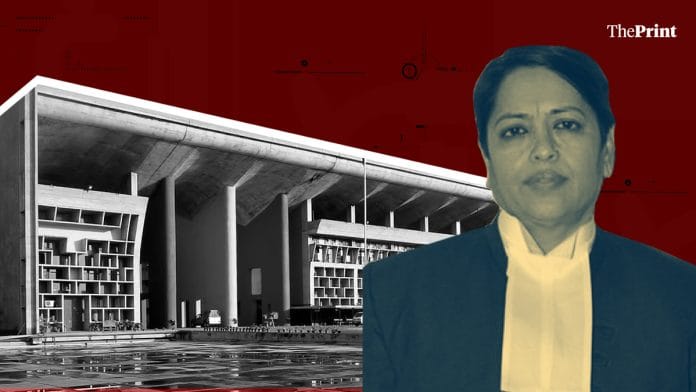New Delhi: A special Central Bureau of Investigation (CBI) court flagged procedural lapses on the part of the prosecution, conflicting testimonies of several key witnesses, and a prosecution case built largely on circumstantial evidence while acquitting Justice (retd) Nirmal Yadav in the 2008 cash-at-judge’s-door case.
The Special CBI Court in Chandigarh, presided over by Judge Alka Malik, acquitted retired Justice Nirmal Yadav and three others—Ravinder Singh Bhasin, Rajiv Gupta, and Nirmal Singh—in a high-profile corruption case that had lingered for over 16 years.
Sanjiv Bansal, a former additional advocate general, Haryana, who was arrayed as the ‘number one’ accused in the CBI case, died of illness in February 2017.
The judgment, delivered on 29 March 2025, dismissed charges under the Prevention of Corruption Act, 1988, and the Indian Penal Code (IPC), citing a lack of legal evidence to substantiate the CBI’s allegations.
In the judgment, uploaded on the e-courts Chandigarh website Wednesday, the court ruled that the prosecution failed to establish its case beyond a reasonable doubt.
It brought an end, at least for the time being, to a legal battle that lasted over a decade, with serious allegations of corruption and judicial misconduct at its core.
The case against Justice Yadav
On 13 August 2008, when Parkash Ram, Bansal’s clerk, accidentally delivered a bag containing Rs 15 lakh to the residence of Justice Nirmaljit Kaur, a sitting judge of the Punjab and Haryana High Court, instead of its intended recipient.
The CBI alleged that the money was meant for Justice Nirmal Yadav, also a sitting judge at the time, as a bribe orchestrated by Bansal, Bhasin, Gupta, and Nirmal Singh.
The prosecution claimed Yadav received this sum and other benefits—an additional Rs 2.5 lakh, air tickets, and a mobile phone—to influence a property dispute case decided in March 2008.
The CBI painted a conspiracy that involved Bhasin, a Delhi businessman, allegedly funneling the money through Bansal, who, delayed en route from Delhi, instructed his wife to send it through Parkash Ram.
Gupta and Singh were accused of “fabricating evidence”—a false agreement to sell—to cover up the botched delivery after it reached Justice Kaur’s residence.
Yadav was charged under Section 11 of the Prevention of Corruption Act for accepting illegal gratification, while the others faced charges of abetment and evidence-tampering under IPC Sections 120B (criminal conspiracy), read with Sections 193, 192, 196, 199 and 200 of the Indian Penal Code.
The trial saw 78 prosecution witnesses, including Justice Kaur and key police officials, and voluminous documentary evidence, such as call records and seized currency.
Initially, in 2009, the CBI filed a closure report, citing insufficient evidence and lack of prosecution sanction, backed by then-attorney general Milan K. Banerjee’s opinion that “there is not a shred of evidence” linking the accused to the offences.
However, the CBI court rejected this in 2010, ordering further investigation, which led to a chargesheet in 2011 after sanction was obtained against Yadav in 2011, by a then judge at Uttarakhand High Court.
Court’s reasoning for acquittal
In its detailed verdict, the CBI court primarily based its decision on the lack of conclusive evidence linking Justice Yadav and the other accused to the corruption charges.
The court noted that the prosecution was unable to establish a clear link between the cash delivered to the residence of Justice Nirmaljit Kaur and any direct involvement of the accused, adding that the case was built largely on circumstantial evidence.
The investigation did not provide conclusive evidence of who sent the money and for what purpose.
Several key witnesses also provided conflicting testimonies, weakening the prosecution’s case. The court also pointed out that the statements made during the initial investigation did not align with the evidence presented in court.
The court delivered a scathing critique of the prosecution’s case, particularly targeting the testimony of Raj Kumar Jain, an additional district judge, whose evidence was deemed unreliable and pivotal to the CBI’s failure.
Justice Malik observed that Jain’s statements were “improved and exaggerated as compared to his previous statements”, noting his inability to substantiate claims of pressure from Nirmal Yadav.
The judgment states, “In his further cross-examination he could not give any specific reply of the alleged pressure maintained by Yadav, though has tried to give very evasive replies.”
The court further highlighted that despite Jain’s claim that that he had informed the Supreme Court about making statements to the CBI through a Special Leave Petition, “he has not given anything in writing separately,” questioning his credibility.
The special CBI judge also pointed out procedural lapses, saying, “He did not seek permission for making three statements before the CBI in this case,” and dismissed his justification that no such rule existed.
Concluding that Jain’s evidence was “based upon all improvements, assumptions, presumptions, hypothesis and all falsehood,” the court ruled that this reliance on an untrustworthy witness was a key factor in the acquittal of all accused, as the prosecution failed to present credible evidence to support its charges.
The court observed that the defence successfully argued that the CBI’s handling of the case suffered from procedural lapses, including delays in filing charges and gaps in the chain of custody for crucial evidence. The court acknowledged that these flaws further weakened the case against the accused.
Since criminal cases require proof beyond a reasonable doubt, the court ruled that the benefit of doubt must go to the accused.
(Edited by Sanya Mathur)






